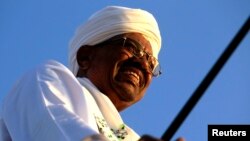Sudan begins voting Monday in general elections that will last three days.
The front-runner and really the only runner in the presidential poll is longtime strongman President Omar al-Bashir, who has been busy forming new alliances and facing down old enemies.
Here are seven things to know about Sudan’s elections.
1. Bashir Strong as Ever
Let there be no doubt, the outcome of this vote is all-but certain: President Bashir and his National Congress Party will stay in power.
Bashir came to power in an Islamist-backed coup in 1989. He is a controversial figure, widely condemned by human rights groups for clamping down on freedom of expression in the country, and wanted by the International Criminal Court for genocide and war crimes committed in the Darfur region in the early 2000s.
But he has appealed to voters as a man who can maintain stability in the country, as the military fights off armed rebellions in Darfur, South Kordofan and Blue Nile states.
2. South Sudan
This is the first national election since South Sudan declared independence in 2011. Unlike previous elections, there will be no candidates for national positions running from the south. But relations with Juba remain a key issue - when South Sudan split, it took with it about two-thirds of Sudan’s oil production.
While Sudan’s economy has recovered for the most part, it still relies on transit fees for oil shipped from South Sudan through the north. Ongoing civil conflict in South Sudan is threatening that revenue stream as well.
3. Governors No Longer Elected
In January the parliament approved a constitutional amendment that gave the president new powers to appoint state governors who were previously elected.
Analysts see the move as another attempt to consolidate power in Khartoum, and to control politics in states where the government is fighting off armed rebellions.
“It’s absolutely outrageous,” said former presidential adviser Ghazi Salahaddin al-Atabani, of the constitutional amendment. “They are deliberately unleveling the playing field.”
Bashir has said the change aims to stop sectarian tensions that were amplified by the election of governors.
4. Opposition Boycott
Sudan’s marginalized opposition is going to sit this election out, as they did in 2010. Leaders have complained that the ruling National Congress Party runs too many of the institutions in the country, and they will not get a fair shake.
"We are not trusting this coming election will be genuine and fair,” said Deputy chair of the opposition National Umma Party Fadul Allah Burma Nasir. “We consider that now the National Congress Party are just like a one-man show.”
Keeping a tight grip on its critics, Sudanese authorities confiscated print editions of newspapers more than 52 times last year and shut down or raided numerous civil society organizations.
5. Election? What Election?
Perhaps it’s no surprise that when the outcome is pretty much accepted, there has been little enthusiasm for this election among voters. While Bashir’s supporters may be fired up for the polls, concerns about the conduct of the vote are keeping others away.
“I don’t think the elections are fair and credible,” said 22-year old university student Rammah Mohamoud Al-Naim in Khartoum. “There is no point in me voting.”
Sudan’s election commission said it expects up to 50 percent voter turnout.
6. Cozying Up to Saudi Arabia
Sudan has joined the Saudi-led military operations against Houthi rebels in Yemen, contributing four aircraft and promising up to 6,000 soldiers to join the fight. The move has been a major talking point during Bashir’s campaign and is seen as part of a broader foreign policy strategy to cozy up to Saudi Arabia.
“One large chunk of Bashir’s propaganda is to say that we’ve improved relations with Riyadh and we are expecting the rewards,” said Sudanese writer and academic Magdi el-Gizouli. “Probably there will be some rewards, but probably not as large as he claims them to be.”
7. Poll Monitors Exit
While the Arab League, the African Union and the regional group IGAD will send monitors, the U.S.-based Carter Center and the European Union will not be observing the vote.
The EU, which provided funding for the 2010 elections (a necessity to usher in South Sudan’s independence) declined to do so this time around. The EU High Representative issued a statement explaining that Khartoum had not lived up to promises to hold a “genuine national dialogue” to resolve the country’s internal conflicts and therefore “elections cannot produce a credible result.”
Sudan’s foreign minister summoned the EU representative in Khartoum over the remarks.




